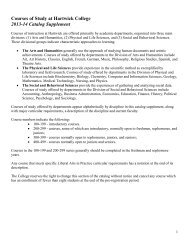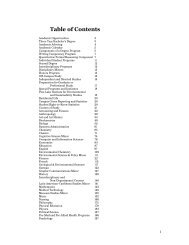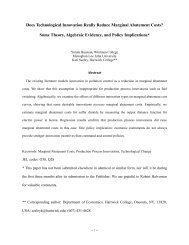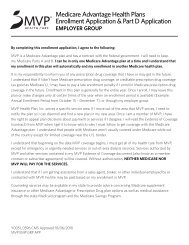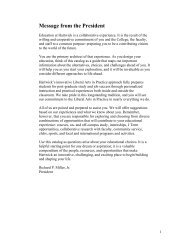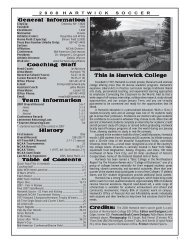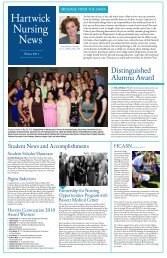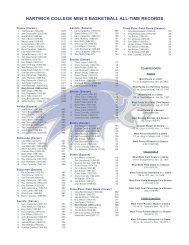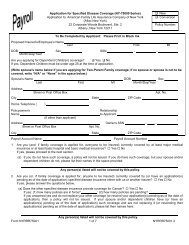Table of Contents - Hartwick College
Table of Contents - Hartwick College
Table of Contents - Hartwick College
Create successful ePaper yourself
Turn your PDF publications into a flip-book with our unique Google optimized e-Paper software.
interactions, the cell cycle and growth control, oncogenesis, homeobox<br />
genes and homeotic mutations, pattern formation and the role <strong>of</strong><br />
development in evolution. Prerequisites: Biol 300 or 301, or permission <strong>of</strong><br />
the instructor. (LAB)<br />
425 Immunology (A) (4 credits; 3 one-hour lectures, 1 three hour<br />
laboratory weekly) A study <strong>of</strong> the basic processes involved in the immune<br />
response. Topics covered will include the structure and function <strong>of</strong> the<br />
immune system, cellular basis <strong>of</strong> the immune response,<br />
immunopathology, autoimmunity and the molecular genetics <strong>of</strong> the<br />
immune system. Prerequisites: Biol 104, 105, 200. (LAB)<br />
428 Comparative Physiology (A) (3 credits; 3 one-hour lectures<br />
weekly) Advanced study emphasizing a comparative physiology <strong>of</strong><br />
animals taken from all phylogenetic levels, with an emphasis in the area<br />
<strong>of</strong> environmental adaptations. Topics covered include temperature<br />
regulation, mechanisms <strong>of</strong> salt and water exchange, circulation,<br />
mechanisms <strong>of</strong> gas exchange, metabolic and physiological responses to<br />
oxygen deficiency regeneration and metamorphosis, etc. Prerequisites:<br />
Biol 104, 105.<br />
435 Behavioral Ecology (A) (3 credits; 3 one-hour lectures weekly) An<br />
advanced examination <strong>of</strong> animal behavior that is set in an<br />
ecological/evolutionary context. The underlying theme <strong>of</strong> the course is<br />
that behavior cannot be understood without placing an organism in its<br />
past and present environment. The subjects covered include the<br />
inheritance <strong>of</strong> behavior, feeding behavior, dispersal and migration,<br />
territoriality, the evolution <strong>of</strong> mating systems, and the evolution <strong>of</strong><br />
complex animal societies. Prerequisites: Biol 303 or Biol 436, or<br />
permission <strong>of</strong><br />
instructor.<br />
436 Evolution (3 credits; 3 one-hour lectures weekly) Study <strong>of</strong> the<br />
patterns and processes <strong>of</strong> organismal evolution. Topics include the<br />
historical development <strong>of</strong> the current theory <strong>of</strong> evolution, population<br />
genetics, molecular evolution, adaptation, speciation and biodiversity,<br />
paleontology, phylogenetic reconstruction and the evolution <strong>of</strong><br />
development. Prerequisites: Biol 104, 105, 200, or permission <strong>of</strong><br />
instructor.<br />
490 Senior Project (Arranged individually; 4 credits: may be taken as 2<br />
credits fall, 2 credits spring) Independent field, laboratory or library<br />
studies on selected topics in biology. Students will participate in a<br />
symposium, where study results will be presented. Before beginning the<br />
study, departmental approval must be obtained. Prerequisite: Biol 392.<br />
Biology<br />
Requirements for the major: As an introduction to the field <strong>of</strong><br />
biology, entering majors must successfully complete foundation courses<br />
in 104 & 105 Principles <strong>of</strong> Biology I & II. These two courses are<br />
prerequisites for all core courses in the biology curriculum (104 & 105<br />
may be replaced by a Biology Advanced Placement test score <strong>of</strong> 4 or 5). In<br />
addition, 200 Genetics must be taken during the student's career and is<br />
a requirement for graduation. The upper-level core courses are split into<br />
three areas: Molecular Biology and Developmental Genetics;<br />
65




